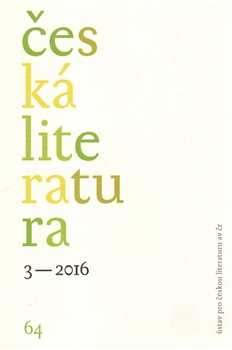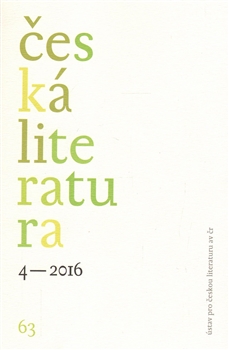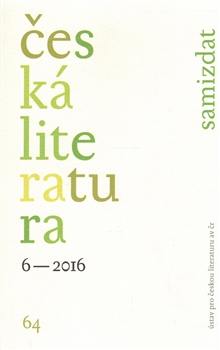
Pavel Janoušek: Ten, který byl. Vladimír Macura mezi literaturou, vědou a hrou. Úvod povahopisný
Pavel Janoušek: Ten, který byl. Vladimír Macura mezi literaturou, vědou a hrou. Úvod povahopisný. Praha, Academia 2014. 562 strany.
More...We kindly inform you that, as long as the subject affiliation of our 300.000+ articles is in progress, you might get unsufficient or no results on your third level or second level search. In this case, please broaden your search criteria.

Pavel Janoušek: Ten, který byl. Vladimír Macura mezi literaturou, vědou a hrou. Úvod povahopisný. Praha, Academia 2014. 562 strany.
More...
K exemplům v 17. a 18. století, zvláště v českých postilách
This study refers to the current neglect over research into early modern exempla. Exempla have an unclear genological underpinning (some researchers tend towards the view that they do make up a genre, while others see them more as a literary procedure), while in Bohemia they lack specific catalogues. Studies of period terminology and practice indicate how exempla were perceived in 17th and 18th century homiletic literature and the extent to which preachers might be influenced by their rhetorical rules. It indicates the differences between the use of exempla among preachers upholding traditional rhetorical practice (eloquentia antiqua) and those employing new rhetoric (eloquentia nova). While the former (e.g. Matěj Václav Štajer) had to adapt the entire structure of their preaching in order to incorporate a frequently extensive section of inserted narratives, the latter (e.g. Bohumír Hynek Josef Bilovský and Fabián Veselý) incorporated exempla directly into expository passages in various ways (using them as expository material, removing the compositional seams, inserting their own commentaries, compositionally dividing selected exempla and so forth). The author concludes by considering the reasons for the disappearance of exempla after the middle of the 18th century. As an example of the interpretational possibilities he adds the use of the same narrative by three preachers and points out the varied nature of the issues which the quest for the usage origins of specific exempla might raise.
More...
This article focuses on aspects of the theoretical issues involved in writing literary history. These reflections are based on the apparently acute conflict between historical analyses which promote discontinuity as an instrument and object of research (Michel Foucault) and concepts of literary history, which endeavour to base themselves on some kind of continuity. The author sees a way out from this stark theoretical contradiction represented by the terms ‘‘tradition’’ and ‘‘discontinuity’’ in a shift of attention towards the ethical aspects of literary history, finding arguments for seeking an ethical dimension in literary-history work, particularly in the hermeneutics of Hans-Georg Gadamer, Paul Ricoeur, a book by Polish researcher Ewa Domańska Historia egzystencjalna (2012) and the New Historicism of Stephen Greenblatt. Based on his analysis of the ethical aspects behind the ideas of these theorists, the author concludes that the essence of the past makes itself felt in its disturbing uncertainty, mutability, multiplicity and otherness. Any text from the past that becomes the subject of historical research is based on an ethical relationship involving the idea of debt. Literary history does not consist in the confirmation of continuity (e.g. national historiography), but quite the reverse in its constant querying and pursuit. Every text may be perceived as a resonating board (a ‘‘trace’’ of the past) that facilitates a confrontation with otherness. In this way attention might be focused on neglected phenomena, such as human emotions, desires, fear, pain and corporeality through marginal or forgotten texts, as records of the ‘‘movements’’ of living human beings who strove for something and who actually lived.
More...
Dmitrij Sergejevič Lichačov: Textologie (Stručný nástin). Přel. Jitka Komendová, Praha, Ústav pro českou literaturu AV ČR, 2015. 140 stran.
More...

Michael Wögerbauer — Petr Píša — Petr Šámal — Pavel Janáček et al.: V obecném zájmu: cenzura a sociální regulace literatury v moderní české kultuře. 1749–2014. Praha, Academia 2015. 2 svazky, 1 661 strana.
More...
Aleš Haman — Dalibor Tureček et al.: Český a slovenský literární parnasismus. Synopticko-pulzační model kulturního jevu. Brno, Host 2015. 426 stran.
More...
This study focuses on the prose work of Jiří Gruša Mimner aneb Hra o smrďocha (Atmar tin Kalpadotia) (Mimner or Play about a Stinker). It is based on an interpretation of an imaginary “Calpadotia’’ as a “state of mind’’, and attention is focused in particular on “Calpadotian’’, the fictitious language of the totalitarian society, and especially the steps whereby the gradual adoption of the rules of this language play a role in the disintegration of the protagonist’s personality. The key to understanding the role of the fictitious language in the novella is found in the unusual way in which Calpadotian structures reality, both with its more subtle differentiation of individual concepts and in particular with its polysemy. This indicates how the usage of the same term for phenomena that Western readers do not consider to be associated helps to characterize Calpadotian society, which gradually assimilates the chief protagonist, as alien and incomprehensible to the point of absurdity. At the same time it works with the idea that such emphasis on the role of language opens up more general questions on its extraordinary nature. The study also compares polysemy in Calpadotian with polysemy in totalitarian Newspeaks and in natural languages, taking into account their literary usage. In polysemy and the association of the apparently inassociable the study seeks the source of the unease which the prose evokes, as well as the source of the paradox and the alienation which makes it a manifestation of artistic resistance to a dystopian society.
More...
Ondřej Koupil: Grammatyka cžeska. Mluvnice češtiny v 16.–19. století (katalog výstavy). Praha, Akropolis 2016. 176 stran, pexeso jako příloha.
More...
This article analyses correspondence sent and received by Karel Havlíček, reflecting mid-19th century gender stereotypes. The text is based on published editions, as well as archive material housed primarily at the Museum of Czech Literature, Literary Archive. Attention is mainly focused on a unique set of letters which the novice journalist exchanged with his one-time fiancée Fany Weidenhoffrová. The letters are compared with prescriptive literature of the period; this comparison indicates that Havlíček’s attitude towards women was in line with the standards of the time and did not differ in any substantial way. Even in the early correspondence the view is held that only the private sphere should be given over to women, who are sensitive and passive creatures, while men are supposed to have the opposite characteristics required for them to be family breadwinners.
More...
Jan Amos Komenský et al.: Dílo Jana Amose Komenského 9/II: Historia Lasitii, Historie Lasitského, Lesnae excidium, Carolo Gustavo votiva acclamatio; Mirna Šolić: Slovo a obraz: Karel Čapek a žánr cestopisu; Eva Hahnová: Od Palackého k Benešovi. Německé texty o Češích, Němcích a českých zemích; Ad Zdeněk Smolka: Historie polské literatury českého Těšínska
More...
Josef Hrdlička — Klára Soukupová — Michal Špína (edd.): Básně a místa. Eseje o poezii. Praha, Filozofická fakulta Univerzity Karlovy/Radioservis 2015. 315 stran.
More...
Pokus o rekonstrukci
This study charts the generation producing Czech Catholic literature that came onto the scene after 1945. Between 1945 and 1948 it enjoyed a relatively conflict-free reception from the older Catholic generation and contemporaries outside the Catholic milieu. It had access to the Vyšehrad journal and the support of Catholic critics from the older generation. This generation more or less accepted the chief landmarks of postwar Catholic culture in Vyšehrad: the Slav orientation, the positive attitude towards socialism and the generational turnover. Two members of this generation aspired to the position of leader and spokesman: Ivan Slavík in Prague and Zdeněk Rotrekl in Brno. However, after 1948 this generation was excluded from literature and its members experienced various twists and turns in life and literature (prison, various shades of the “grey zone”, various forms of collaboration with dissidents and in the case of Josef Jelen even “conversion’’ to normalization literature). As a literary historian, Ivan Slavík has attempted to reconstruct this generation retrospectively and to also include such figures on the fringes as Ivan Diviš and Ladislav Novák. On the other hand Zdeněk Rotrekl is also engaged in literary history, but he focuses more on reconstructing the older Catholic generation rather than his own generation. Hence in this respect we might refer to a “Slavík generation”. As a result this generation appears to be neglected in all the reconstructions and rehabilitations, as it is overshadowed by the older “classic” Catholic generation and the intellectually bolder generation of Catholic-oriented dissident authors.
More...
Michael Wögerbauer — Petr Píša — Petr Šámal — Pavel Janáček et al.: V obecném zájmu: cenzura a sociální regulace literatury v moderní české kultuře. 1749–2014. Praha, Academia 2015. 2 svazky, 1 661 strana.
More...
Richard Změlík: Kvantitativně-korpusová analýza a literární věda. Model a realizace autorského korpusu a slovníku Jana Čepa v kontextu zahraniční a české autorské lexikografie. Olomouc, Univerzita Palackého v Olomouci 2015. 243 strany.
More...
Jan Malura: Meditace a modlitba v literatuře raného novověku. Ostrava, Ostravská univerzita 2015. 278 stran.
More...
Dalibor Dobiáš et al.: Rukopisy královédvorský a zelenohorský a česká věda (1817–1885). Praha, Academia 2014. 934 strany.
More...

O nesamozřejmosti samizdatu v Ledererových Českých rozhovorech
This article looks at uses of the word “samizdat” in the mid-1970s, focusing on České rozhovory (Czech Conversations), a book of interviews that journalist Jiří Lederer conducted with other banned writers (such as Ludvík Vaculík, Václav Havel, Jiří Gruša, Aleksandr Kliment and others) in 1975 and 1976. The author carries out a “thick description” (in the tradition of Clifford Geertz) of the word “samizdat”, uncovering a range of connotations tied to the inadequacy of unofficial culture. Rather than constituting a fully functioning alternative culture, samizdat was often seen as inadequate and artificial (like “palm trees above the arctic circle,” in the words of writer Jaroslav Putík); it was a mere substitute for genuine cultural production, operating in a minimal communications network and preserving a finite, even tiny number of material copies for future generations. The article thus proposes an alternative to a common scholarly reading of Czech unofficial cultural activity in the 1970s, in which samizdat is seen as part of a systematic, well-organized effort to create an alternative culture and thereby to undermine the Communist regime. In fact, as the author suggests through a brief reading of Havel’s “Six Asides About Culture” (1984), “samizdat” acquired these connotations only later – to some extent this happened in the framework of Charter 77 and the whole theory of a “parallel polis,” although the process of “re-reading” samizdat as a widespread and effective communications network continues after 1989 and through to the present day.
More...
Friederike Kind-Kovács: Written Here, Published There. How Underground Literature Crossed the Iron Curtain. Budapest/New York, Central European University Press 2014. 504 strany.
More...